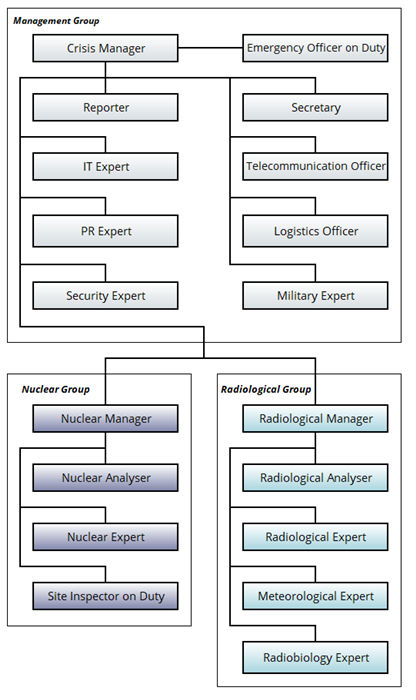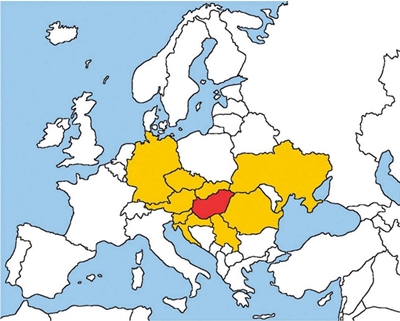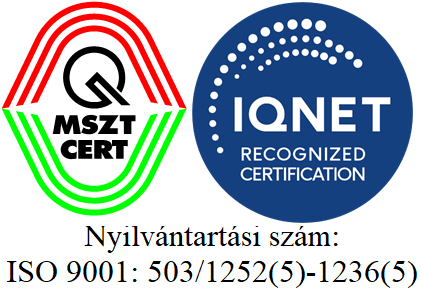ERO
EMERGENCY RESPONSE ORGANIZATION
In Hungary, the act on disaster management regulates and determines the organizations and tasks related to nuclear emergency response. According to the act, the high level lead is taken, in the case of any type of emergencies, by the Disaster Management Interministerial Coordination Committee (hereinafter referred to as committee or DMCC). The committee is chaired by the Minister of the Interior. The committee consists of the high level representatives of the ministries and national organizations involved in the response to a given disaster. The DMCC established an operative task force (National Emergency Management Centre), which has a Nuclear Emergency Response Working Committee (NERWC) to support the decisions. The National Directorate General for Disaster Management (NDGDM) operates a Nuclear Emergency Information and Evaluation Centre and an Emergency Centre. The technical-scientific support of the NERWC is performed by the Emergency Response Organization of the Hungarian Atomic Energy Authority (HAEA), which can be operated independently as well. The NERWC mainly relies on the analysis results of the HAEA and NDGDM.
Tasks of the HAEA cover the provision of technical-scientific expertise and recommendations for the decision-makers on the actual situation and the prognoses of the accident evolution as well as the protective actions necessary for the public.
Role of HAEA in nuclear emergency preparedness and response
The HAEA, as the authority in any issues related to nuclear safety, assumes the right of approval of the Emergency Response Plans of the users of the atomic energy in the frame of licensing procedures.
The HAEA is responsible for evaluation of any on-site nuclear safety related event, with special regard to its environmental consequences. In the case of a nuclear emergency (either in Hungary or abroad) the HAEA ERO shall analyse the given situation and provide prognosis on its potential consequences. The HAEA ERO obtained and maintains the skills and tools necessary for the performance of its tasks. It is the task of the HAEA to evaluate the environmental radiological situation and the potential consequences of a nuclear emergency and to prepare the recommendations for the decision makers on protective actions necessary for the public.
The HAEA is the contact point to receive any notification of an accident in Hungary and abroad should a nuclear or radiological incident occurs. It means in practice that the HAEA Inspector on Duty is ready around the clock to receive a notification from Hungary and the Emergency Officer on Duty from the international community, including the International Atomic Energy Agency (IAEA), the European Union (EU) and the countries concluded bilateral agreement with Hungary. As point of contact, it is the task of the HAEA ERO to notify and inform the countries concluding bilateral agreement, the IAEA and the EU of any nuclear emergency in Hungary.
The HAEA operates the inter-ministerial High Level Working Group which is meant to regularly revise and maintain the up-to-date status of the National Nuclear Emergency Response Plan and the respective technical-scientific documents.
Structure and groups of HAEA ERO
The HAEA ERO consists of three groups:
- Nuclear Group is responsible for performing nuclear analyses,
- Radiological Group carries out radiological analyses, and
- Management Group is responsible for the approval of the various reports, as well as for the coordination of the work of the subordinated groups.

The Crisis Manager, as the final approver, is responsible for all documents formulated and dispatched by the ERO. The group managers check the analysis results and send them to the Crisis Manager for approval. The Reporter is the Deputy Head of the ERO and his/her main task is to finalize the reports to be sent to the Hungarian and international partner organizations. The PR Expert compiles the press releases of the HAEA ERO and organizes its public information activity. The Military Expert helps the work of the HAEA ERO based on his/her expertise and interprets the radiation survey and monitoring data of the Hungarian National Defense Forces. The Crisis Manager holds meetings on a regular basis with the Group Managers. The Secretary is responsible for recording the relevant information in an electronic logbook and for assisting the work of the Crisis Manager. The Telecommunication Officer receives the incoming documents, registers, and delivers the outgoing documents. The Emergency Officer on Duty supports the work of the ERO, primarily in the area of communication and maintenance of contact with external organizations.
The Security Expert liaises with the organization responsible for the physical protection of the compromised facility in order to ensure the coordination of nuclear emergency management and security measures.
The Nuclear Expert assesses the source term and assists the Nuclear Analyser in estimating the status of the plant. The Nuclear Manager organizes the work of and approves the reports prepared by the Nuclear Group. The members of the Nuclear Group are in contact with the Site Inspector on Duty delegated to the emergency organization of MVM Paks NPP, who collects the on-site information requested by the HAEA ERO. Based on the results of the Nuclear Group, the measured environmental radiation data and the meteorological forecasts the Radiological Group analyses, assesses and also predicts the actual and future radiological situation, suggests protective actions to the decision makers for mitigating the possible consequences. The Radiological Manager organizes the work of and approves the reports prepared by the Radiological Group. The Radiological Expert carries out calculations with environmental simulators, the Radiological Analyser monitors and evaluates the available radiation data and together with the Radiological Expert evaluates the radiological situation. The Meteorological Expert is responsible for providing meteorological prognoses. Radiobiological Expert contributes to the work of the group to optimize the protective actions especially concerning the food-chain by running the WRadFood code.
The IT Expert is responsible for maintaining the computing tools and for solving any work station or network related problems that may arise. If the functioning of the ERO is prolonged, then the Logistics Officer provides catering to the members of HAEA ERO.
Duty system
The HAEA Inspector on Duty is tasked, among others, with receiving the nuclear and radiological event notifications from Hungary. He/she is in standby around the clock to receive fax or phone notifications. The Emergency Inspector on Duty receives the notifications of nuclear emergencies from abroad. The duty officers are equipped with smart phones, via which they can send and receive fax and email messages and initiate phone calls. The Nuclear Safety Officer on Duty makes notes of the incoming reports, he/she proceeds by himself/herself in the lower significant incidents of higher frequency, while in an emergency he/she informs the Crisis Manager on Duty.
Alert
Subsequent to the decision on alerting of the HAEA ERO due to an exercise or real emergency, the notification goes through the organization according to the pre-established alert-chain. The Crisis Manager requests the Emergency Inspector on Duty to initiate the alert of the group managers, who then perform the alert of their personnel. After acceptance of the request to participate in the response, the alerted staff shall reach the designated workplace as soon as possible and commence the work specified for their given positions.
INTERNATIONAL COOPERATION IN THE FIELD OF EMERGENCY RESPONSE
Conventions
The legal frame of international cooperation in the field of nuclear emergency response is provided by the conventions on early notification and mutual assistance in case of a nuclear or radiological emergency established under the auspices of the International Atomic Energy Agency and the Euratom directive on the community regulations concerning early information exchange in radiological emergencies. According to the international requirements the receipt of early notifications and dispatch such notification in the case of domestic emergencies the HAEA operates its competent authority duty system on a 24/7 basis.Bilateral agreements
Hungary concluded bilateral agreements with Austria, the Czech Republic, Croatia, Germany, Romania, Serbia, Slovakia, Slovenia and Ukraine to mutually notify each other of nuclear or radiological emergencies in the early phase of such situations and assist each other should such a request is received. The bilateral cooperation provides a good opportunity to share the experience, to organize joint exercises and to elaborate the frames of joint activities.
Cooperation with international organizations
In order to comply with the international obligations, to keep track of the scientific and technical development and to facilitate the exchange of experience the HAEA joins through its staff members the work of the international organizations. The HAEA participates and represents Hungary in the working groups of the International Atomic Energy Agency, the OECD Nuclear Energy Agency, the European Commission and the Heads of European Radiological protection Competent Authorities.



 ©HAEA - All rights reserved
©HAEA - All rights reserved